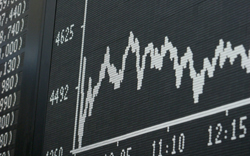Campus
VW ahead on transparency
 DAX-listed companies have to catch up in terms of transparency, criticizes a study by consultancy Klenk & Hoursch. The Frankfurt firm had interviewed 3000 consumers as to how transparent they perceive DAX-listed companies, both in product descriptions and on executive pay. Carmaker Volkswagen cut the best figure, with nearly 45 percent of respondents finding it transparent. Second place went to BMW, followed by Adidas. At the bottom end of the transparency rankings came energy providers RWE and E.on and insurance company Munich Re.
DAX-listed companies have to catch up in terms of transparency, criticizes a study by consultancy Klenk & Hoursch. The Frankfurt firm had interviewed 3000 consumers as to how transparent they perceive DAX-listed companies, both in product descriptions and on executive pay. Carmaker Volkswagen cut the best figure, with nearly 45 percent of respondents finding it transparent. Second place went to BMW, followed by Adidas. At the bottom end of the transparency rankings came energy providers RWE and E.on and insurance company Munich Re.
Financial statements faster
Companies have increased the speed of their reporting despite steadily rising requirements, but are no longer willing to trade speed against quality. According to a study by PwC, last year nearly one in two of 230 surveyed companies could provide a certified financial statement at an earlier stage than in 2009. Particularly fast companies achieved this after only 19 working days. In the two previous years a good 40 percent and 35 percent respectively of companies surveyed were able to shorten their time; at a good one in ten companies, reductions even of more than five working days were possible in 2009, as the latest “Reporting Survey” from the auditing and consulting company shows. Despite the time constraints, final quality has according to PwC priority for 65 percent of respondents, and 85 percent will seek a further increase in quality. Specifically, further standardizing (60 percent of responses), more integrated systems and interfaces (55 percent) and training at group companies (41 percent) will be pursued.
One in four balance-sheets faulty
In the first six months of this year, the German Financial Reporting Enforcement Panel (DPR) has again identified numerous errors in corporate balance-sheets. The error rate of 26 percent was average for recent years. The accounting watchdogs regard a lot of mistakes in the annual reports of German companies as inevitable, however, as companies are unable to cope with the ever more complicated rules. Most errors were due to the intricate accounting of acquisitions and disposals of firms. So far this year 22 companies have had to disclose accounting deficiencies, and last year it was 31. Behind one of the incorrect balance sheets, according to DPR, is even a DAX company. The process is not yet complete, so there is currently no disclosure. The previous year, Infineon and Merck were affected.
DSW in cooperation with university
 Shareholder association Deutsche Schutzvereinigung für Wertpapierbesitz e.V. (DSW) and the University of Bremen will jointly launch a hands-on programme in which they explain issues of investment advice and investment to students. “Interested students are to be given the opportunity, at shareholders’ meetings or at conferences and Action Forums which DSW regularly organizes nationwide, to participate,” says the CEO of DSW, Ulrich Hocker. The collaboration will also include special courses as well as the supervision of practice-oriented diploma and bachelor theses. Joint events by the DSW and the University of Bremen are planned for the years 2012/2013.
Shareholder association Deutsche Schutzvereinigung für Wertpapierbesitz e.V. (DSW) and the University of Bremen will jointly launch a hands-on programme in which they explain issues of investment advice and investment to students. “Interested students are to be given the opportunity, at shareholders’ meetings or at conferences and Action Forums which DSW regularly organizes nationwide, to participate,” says the CEO of DSW, Ulrich Hocker. The collaboration will also include special courses as well as the supervision of practice-oriented diploma and bachelor theses. Joint events by the DSW and the University of Bremen are planned for the years 2012/2013.















